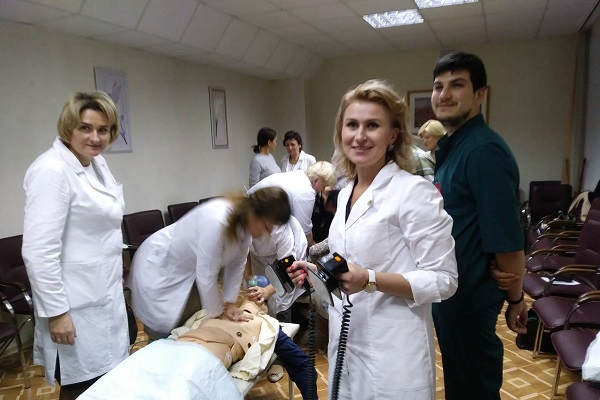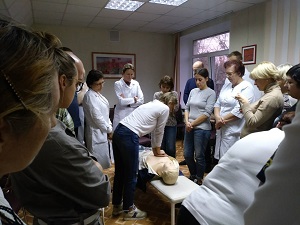On November 7, 2018, the Department of Anesthesiology and IC, together with the Education Committee of the Association of Anaesthesiologists, perfuziologists and intensive care physicians, began the cycle of TI "Basic and Advanced Life Support in Adults" for 42 doctors of the Diagnostic and Advisory Center of the Pechersk District of Kyiv.

This event was initiated by the leadership of the diagnostic and advisory center and aimed at improving the practical skills of physicians in providing emergency care in critical conditions.
Among the 42 participants were the following specialists: therapists, cardiologists, traumatologists-orthopedists, obstetrician-gynecologists, neurologists. Also, the training was attended by the heads of the structural unit: deputy director of the diagnostic center, medical director, heads of departments.
In front of the doctors with a speech, the head of the department of anesthesiology and IT professor Loskutov OA, emphasized the importance of conducting courses covering the combination of the theoretical part and working out practical skills on mannequins, work in the team, working out protocols for emergency care through simulation clinical scenarios.

On the first day of the cycle, within 4 hours the doctors of the department worked as doctors: associate professor. Kuchynska IA, assistant Kolesnikov VG, clinical resident Kamenyuk KV.
On mannequins, doctors developed skills to restore airway patency, indirect heart massage, the use of an automatic external defibrillator, the use of a bi-phasic defibrillator. All theoretical and practical stations were based on the recent recommendations from the European Council of Reanimation and the American Heart Association (AHA).

At the end of the classes, doctors worked out a variety of thematic scenarios with multifactor heart stops (acute coronary syndrome with cardiac arrest, bleeding with cardiac arrest, respiratory failure). The assessment of the quality of practical skills and the level of assimilation of material was carried out by the teachers of the department using the developed check-lists.
Doctors showed a high interest in learning and were captured by the practical content of the course.
This cycle is a good school of practical interaction between the department and the association in conducting the educational process among doctors who are not specialized specialty and will be further extended in other areas.